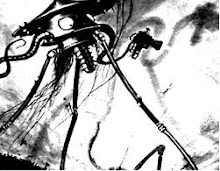Universal Health Care
Today's Baltimore Sun has an Op/Ed by Jim Jaffe titled, "How would we enforce mandatory health coverage?" The column misses the point entirely about what universal health care actually is.
Jaffe writes, "But how will the new system deal with those who fail to buy the required insurance? There will be more than a few of them." No shit, sherlock. That's exactly what is the problem with the current system -- about 47 million people are unable to afford health insurance. The whole idea behind universal health care is that people won't have to buy their coverage anymore; instead, it'll be available to everyone who needs it.
Maybe I've got Jaffe's column figured out wrong here, but he writes about "any such universal system" in his article. This leads me to believe that Jaffe is discussing the idea of universal coverage in any form. Not at any point does Jaffe offer the alternative to a mandatory health coverage purchase by citizens, which is actually what universal health care advocates are fighting for -- that the government foot the insurance bill.
Jaffe also discusses a point that many workers simply refuse coverage offered by employers, which is interesting:
More than a third of employees who are offered insurance at work opt out. Most of them get coverage elsewhere, but nearly a quarter simply go without insurance. These are people who think they have more important things to do with their money. Some will feel that way even if the price is cut. That's not necessarily irrational, particularly if you're among the healthiest 50 percent of the population that accounts for only 3.4 percent of the nation's annual health bill.Actually, that is quite irrational in a universal system. One of the values of a universal system is the idea of shared risk. Shared risk means that we all pay equally into the system, regardless of our current health condition, to subsidize those who need health care. Since all citizens would be paying into the system equally through taxes, everyone citizen will have access to health care when they need it, without having to face the burden of high monthly premiums, co-pays, and other costs as a barrier to access.
Currently, our for-profit model of private health insurance allows the healthy to pay less, with the reasoning that they use less health care. What are the side effects of this model? Those who actually need health care end up paying more for their insurance. This effectively turns health care into a class system, in which only the affluent can afford their care. Those who cannot go without coverage, because the healthy are not subsidizing the sick in our private system. This is partly why approximately 47 million Americans go without health insurance -- no one is helping them out.
Jaffe goes on to relate this to Social Security and Medicare:
Many of them would also not participate in Social Security and Medicare if they could opt out. But they don't have that choice, which explains why the participation in these two programs is nearly 100 percent.And there's good reason people cannot opt out of those programs -- they are built upon the idea of shared risk, which partly explains their longevity. Additionally, those two programs are considered the government's most successful, which have incredibly low administrative costs. This means that we get what we pay for in those two programs, with virtually no money wasted. Private insurance, on the other hand, has administrative costs that continue to rise. A universal health care system administered by the government would be much more efficient with our money than a private corporation.
So, yes, Jaffe is right to criticize a mandatory health care insurance purchase by consumers. But it would have been informative for Jaffe to explain what a real universal health care system is and offer that as an alternative for readers, as well as not leave the impression that mandatory health care is the same as universal health care.



No comments:
Post a Comment